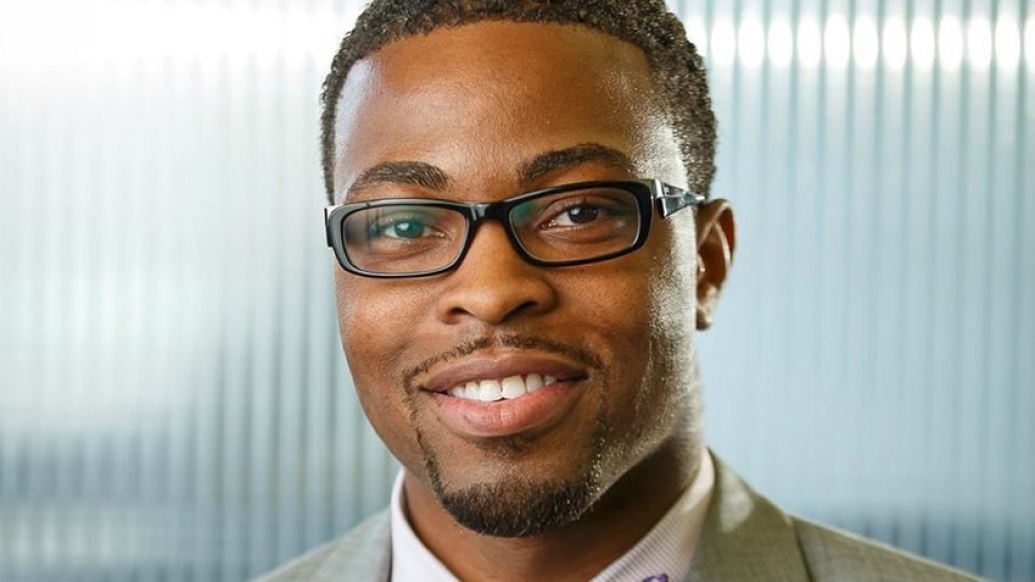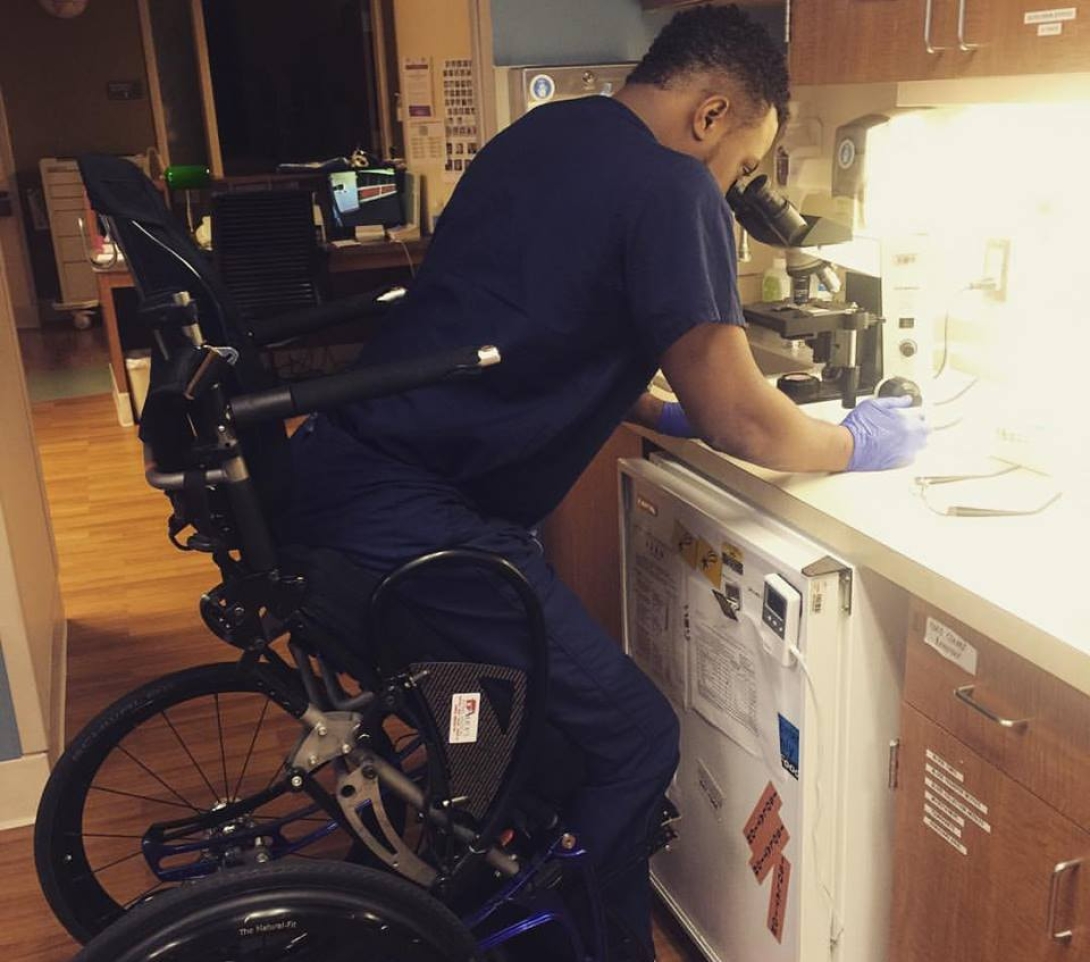Compared with the general population, few physicians have disabilities. A Michigan Medicine doctor explains how a personal accident shaped his professional path.
7:00 AM
Author |

Oluwaferanmi Okanlami, M.D., M.S., distinctly understands both sides of a catastrophic medical event.
MORE FROM MICHIGAN: Sign up for our weekly newsletter
That's because he has been a patient and a doctor in that scenario.
In 2013, Okanlami was on his way to becoming an orthopaedic surgeon. The University of Michigan Medical School graduate was in his third year of residency at Yale New Haven Hospital in Connecticut.
But his dreams were almost derailed after sustaining a spinal cord injury at a Fourth of July pool party with friends and fellow residents.
"I jumped into the pool," he says. "I didn't do a backflip or anything like that. There was no diving board, but I hit either the ground or the side of the pool or someone's leg. I can't be completely sure, but immediately I was unable to move anything from my chest down."
Okanlami's medical instincts kicked in.
"In my mind, I was thinking of next steps: Stabilize my spine, get me onto the stretcher and get me to the hospital," he says. He also credits his colleagues for the expert care he was given from the beginning — quickly springing to action, getting him from the pool to the emergency department and onto the operating room table in record time.
Faith and progress
Okanlami's journey after the accident seems like something out of a Hollywood movie. Despite breaking his neck and becoming paralyzed from the neck down, he never doubted he'd be able to live a productive and independent life, still planning to leave his mark on the world.
"I have an interesting intersection of science and faith, such that even if doctors had said to me I would never walk again, I wasn't going to let that limit what I hoped for my recovery," Okanlami says. "I know there is so much we don't know about spinal cord injury, and I know the Lord can work miracles."
On Sept. 8, 2013, just two months after the accident, Okanlami moved his leg again.
"It was one of the most amazing days of my life," he says. "It wasn't a small flicker of a little muscle. I extended my leg at the knee. It was pretty sweet."
A renewed energy
The accident didn't end Okanlami's professional pursuit, but it did send him down a different path. After months of inpatient rehabilitation, he moved home to South Bend, Indiana, to live with his parents — both doctors themselves — to continue extensive outpatient rehabilitation.
SEE ALSO: For This Michigan Family, Medicine Is a Way of Life
While learning to walk again, Okanlami found time for many other achievements.
He earned a master's degree in engineering, science and technology entrepreneurship from the ESTEEM Program at the University of Notre Dame. He was appointed by the mayor of South Bend to sit on the county's board of health. He became the coach of the River City Rollers, a wheelchair basketball team.
And as if all of that weren't enough, he also went back to being a doctor.
"During my rehabilitation period, I was blessed with the opportunity to return to work as a physician in the family medicine residency program at Memorial Hospital" in South Bend, says Okanlami. "I was able to take care of patients from cradle to grave — delivering babies, taking care of patients in nursing homes and everything in between."
His journey comes full circle in early 2018 when he joins the Family Medicine and Physical Medicine and Rehabilitation faculty at Michigan Medicine.
Shifting attitudes and awareness
Dedicated to the belief that disability does not mean inability, Okanlami is more than just a doctor. He's also an advocate and mentor for physicians and patients with similar backgrounds.
More than 20 percent of Americans live with a disability, after all, but as few as 2.7 percent of them are practicing physicians. One reason for the gap: Technical standards used for admission at many medical schools require physical aptitude, which can inadvertently exclude applicants with disabilities.
Okanlami found a perfect match at UM Family Medicine. A new social media campaign, #DocsWithDisabilities, based out of the Family Medicine department, is working to raise awareness about doctors with disabilities. Okanlami and his colleagues share a passion for and a focus on disability inclusion in medicine that is fueling their research agenda. Doctors Philip Zazove, Michael McKee, Lisa Meeks and others are researching mechanisms for improving access to medicine for physician, learner and patient populations.
"Increasing physician diversity has a positive impact on patient care and access for other marginalized groups," and it may result in similar improvements for patients with disabilities, says Meeks, a leading researcher in disabilities in medical education and a clinician scholar at U-M's Institute for Healthcare Policy and Innovation.
Okanlami's vision has led to a joint appointment in the Department of Physical Medicine and Rehabilitation as well as a role in The Office for Health Equity and Inclusion — partnerships he hopes to further his desire to "disabuse disability" and create a health system that is inclusive and accessible to all.

Standing strong
While he can't run yet, Okanlami can walk using assistive devices, some of which he has worked with a rehabilitation engineer to design and create. He also has a standing frame wheelchair that has been more versatile than he could have imagined. Despite his love for gadgets, he still tries to make time for regular exercise to stay physically fit for now, but with a goal of leaving the assistive devices behind some day.

Explore a variety of health care news & stories by visiting the Health Lab home page for more articles.

Department of Communication at Michigan Medicine
Want top health & research news weekly? Sign up for Health Lab’s newsletters today!





